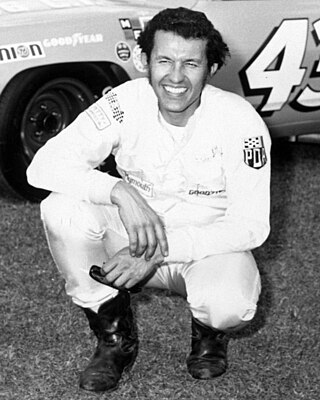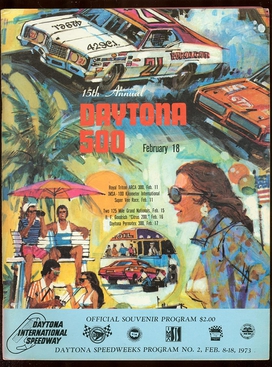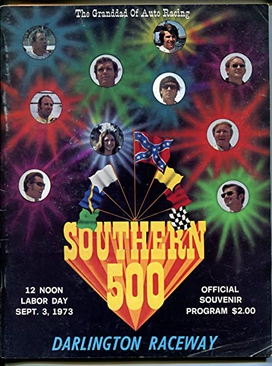
The 1974 NASCAR Winston Cup Series was the 26th season of professional stock car racing in the United States and the 3rd modern-era NASCAR Cup series. The season began on Sunday January 20 and ended on Sunday November 24. The first 15 races were shortened 10 percent due to the 1973 oil crisis. Following criticism of the 1972 and 1973 points systems that placed emphasis on completed miles, NASCAR implemented a new points system, that took basic purse winnings, multiplied by number of starts, and divided by 1,000; it was designed to more directly reward winning races, a response to Benny Parsons' championship the previous year with just one win. Richard Petty was Winston Cup champion at the end of the season finishing 567.45 points ahead of Cale Yarborough, while David Pearson finished a strong third in points despite only nineteen starts. Earl Ross was named NASCAR Rookie of the Year.
The 1979 NASCAR Winston Cup Series was the 31st season of professional stock car racing in the United States and the 8th modern-era Cup series. It began on Sunday, January 14, and ended on Sunday, November 18. Richard Petty won his seventh and final Winston Cup championship, winning by 11 points over Darrell Waltrip. Dale Earnhardt was crowned NASCAR Rookie of the Year.

The 1977 Daytona 500, the 19th running of the event, was held on February 20, 1977, as the second race of the 1977 NASCAR Winston Cup Series Season.

The 1973 Daytona 500, the 15th running of the event, was won by Richard Petty on February 18, 1973, at Daytona International Raceway in Daytona Beach, Florida.

The 1971 Daytona 500, the 13th running of the event, was a NASCAR Winston Cup Series race held on February 14, 1971 at Daytona International Speedway in Daytona Beach, Florida. Spanning 500 miles (800 km) on the paved oval track, it was the first Daytona 500 in the Winston Cup era of NASCAR. During this time, Richard Petty was becoming one of the winningest veterans on the NASCAR circuit.
The 1971 NASCAR Winston Cup Series season began on January 10 and ended on November 20. Richard Petty was the champion for this Winston Cup season. After 20 years of being named the NASCAR Grand National Series, R. J. Reynolds first became the primary sponsor in a decade where the growing anti-tobacco movement banned its advertisement on television and motorsports was the ideal place to place their advertisements. Through NASCAR, Winston merchandise was unveiled to live viewers of the races. This kind of merchandise would also be given out at stores that sold cigarettes in subsequent years. Race car drivers were encouraged to smoke cigarettes until the mid-2000s brought in strict drug testing policies in addition to a smoking cessation program by Nicorette, a GlaxoSmithKline brand.
The 1970 NASCAR Grand National Series season began on Sunday January 18 and ended on Sunday November 22. Bobby Isaac was the champion of the series as NASCAR transitioned from the Grand National era to the Winston Cup era. Only one foreigner was racing that year, a Canadian named Frog Fagan. It was also the last NASCAR national touring series season to feature a dirt track race until the 2013 NASCAR Camping World Truck Series, and the last time the Cup series raced on dirt until the 2021 NASCAR Cup Series.

The 1970 American 500 was a NASCAR Grand National Series event that was held on November 15, 1970, at North Carolina Motor Speedway in Rockingham, North Carolina. Jim Paschal qualified the #40 vehicle for Pete Hamilton.

The 1979 Southern 500, the 30th running of the event, was a NASCAR Winston Cup Series race that took place on September 3, 1979, at Darlington Raceway in Darlington, South Carolina.

The 1972 NASCAR Winston Cup Series was the 24th season of professional stock car racing in the United States and the 1st modern-era NASCAR Cup series season. The season began on Sunday January 23 and ended on Sunday November 12. Richard Petty won his second consecutive Winston Cup Championship and fourth overall. Larry Smith was named NASCAR Rookie of the Year.

The 1974 National 500 was a NASCAR Winston Cup Series racing event that took place on October 6, 1974, at Charlotte Motor Speedway in Concord, North Carolina.

The 1969 National 500 was a NASCAR Grand National Series stock car race that was held on October 12, 1969, at Charlotte Motor Speedway in Concord, North Carolina. This race is still being held in today's Monster Energy NASCAR Cup Series as the 'Bank of America 500'.

The 1975 National 500 was a NASCAR Winston Cup Series race that took place on October 5, 1975, at Charlotte Motor Speedway in Concord, North Carolina.

The 1976 Los Angeles Times 500 was a NASCAR Winston Cup Series race that took place on November 21, 1976, at Ontario Motor Speedway in Ontario, California. Each copy of the souvenir program was $2.

The 1970 National 500 was a NASCAR Grand National Series stock car race that was held on October 11, 1970, at Charlotte Motor Speedway in Concord, North Carolina.

The 1973 Medal of Honor Firecracker 400 was a NASCAR Winston Cup Series race that took place on July 4, 1973, at Daytona International Speedway in Daytona Beach, Florida.

The 1973 Southern 500, the 24th running of the event, was a NASCAR Winston Cup Series racing event held on September 3, 1973, at Darlington Raceway in Darlington, South Carolina.

The 1972 American 500 was a NASCAR Winston Cup Series racing event held on October 22, 1972, at North Carolina Motor Speedway in Rockingham, North Carolina. While not televised, the 1972 American 500 was covered by local radio stations WAYN-AM and WEEB-AM.

The 1970 Alabama 500 was a NASCAR Grand National Series event that was held on April 12, 1970, at Alabama International Motor Speedway in Talladega, Alabama. As the inaugural running of what is now known as the GEICO 500, it helped to serve as a prime example of Talladega races yet to come.

The 1970 Rebel 400 was a NASCAR Grand National Series event that was held on May 9, 1970, at Darlington Raceway in Darlington, South Carolina. The race is known for a crash involving Richard Petty that inspired NASCAR to implement the window net, a mandatory safety feature in today's NASCAR vehicles.













